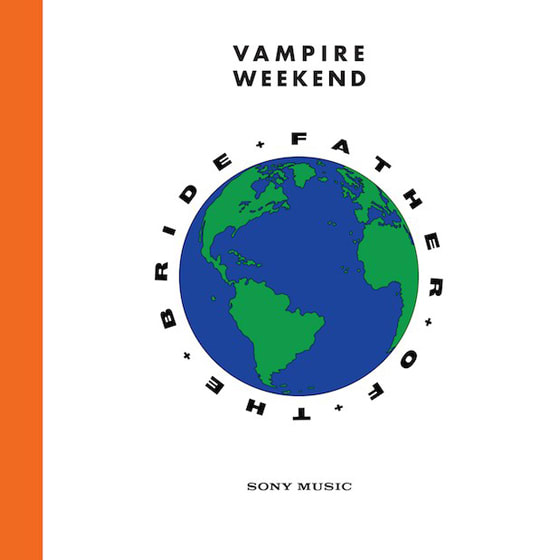Much has been made about Vampire Weekend's aesthetic, from the polo shirts and boat shoes dress code that usurped attention in their early days to the thematically aligned album covers of their first three albums, featuring curated photo stills from different decades that all felt plucked from the same world.
It's fitting, then, that the cover of Father of the Bride depicts a very different world, a cartoonish version of our own with stretched, 1995-era WordArt spelling out the title. On the band's first album in six years, and first since the departure of producer/multi-instrumentalist Rostam Batmanglij, the cover alone invites listeners to perceive anew, to unpack their pre-conceptions and expect something different.
Helmed by frontman Ezra Koenig and trusty collaborator Ariel Rechtshaid, Vampire Weekend has transitioned into a collaborator-driven project, with a who's who of guests new and old joining in for the project's biggest album to date. To keep things cohesive despite the album's lengthy, guest-driven structure, Koenig wisely enlists several key contributors for multiple appearances, providing the album with several interwoven threads that recur with expert timing. Danielle Haim shows up to add some country twang, while the Internet's Steve Lacy brings some lounge jazz vibes to the proceedings. Shorter interludes like "Bambina," "Big Blue" and "Rich Man," sprinkled throughout as palate cleansers, help keep the album moving along without becoming overwrought.
Father of the Bride nimbly juggles many ideas while also anxiously anticipating the many narratives that the world at large have been ascribing to the band since they blew up over a decade ago including, but not limited to: Batmanglij's departure (he offers some guest production on several tracks); accusations of cultural appropriation (in addition to more Graceland comparisons, yes, there's scatting); the project's Ivy League origins, as expressed through lyrical esoterica (with wide-ranging references to history and pop culture that could give James Holzhauer a run for his money).
Someone as hyper-aware as Koenig can't ever fully close his eyes to the criticisms, but the album's best moments come when he puts them as far away in the distance as he can: highlight "Unbearably White," which takes its name from a glib phrase often lobbed against Vampire Weekend and their cohort of mid-aughts indie rockers, sidesteps the criticism entirely for vague lyrics about relationships wrapped in metaphorical snow-capped mountains. "Sooner or later, the story gets told," he sings. "To tell it myself would be unbearably bold."
Vampire Weekend have never taken themselves too seriously (they've had plenty of critics to do so instead), and now that they're mostly unburdened from the narratives of their past, Father of the Bride finds them at their most relaxed, jovial and inviting. Or, as Koenig asserts at the start of "Sympathy," a late-album flamenco cut that serves as one of the band's most bonkers tracks to date: "Sometimes I take myself too serious; it's not that serious."
(Sony Music)It's fitting, then, that the cover of Father of the Bride depicts a very different world, a cartoonish version of our own with stretched, 1995-era WordArt spelling out the title. On the band's first album in six years, and first since the departure of producer/multi-instrumentalist Rostam Batmanglij, the cover alone invites listeners to perceive anew, to unpack their pre-conceptions and expect something different.
Helmed by frontman Ezra Koenig and trusty collaborator Ariel Rechtshaid, Vampire Weekend has transitioned into a collaborator-driven project, with a who's who of guests new and old joining in for the project's biggest album to date. To keep things cohesive despite the album's lengthy, guest-driven structure, Koenig wisely enlists several key contributors for multiple appearances, providing the album with several interwoven threads that recur with expert timing. Danielle Haim shows up to add some country twang, while the Internet's Steve Lacy brings some lounge jazz vibes to the proceedings. Shorter interludes like "Bambina," "Big Blue" and "Rich Man," sprinkled throughout as palate cleansers, help keep the album moving along without becoming overwrought.
Father of the Bride nimbly juggles many ideas while also anxiously anticipating the many narratives that the world at large have been ascribing to the band since they blew up over a decade ago including, but not limited to: Batmanglij's departure (he offers some guest production on several tracks); accusations of cultural appropriation (in addition to more Graceland comparisons, yes, there's scatting); the project's Ivy League origins, as expressed through lyrical esoterica (with wide-ranging references to history and pop culture that could give James Holzhauer a run for his money).
Someone as hyper-aware as Koenig can't ever fully close his eyes to the criticisms, but the album's best moments come when he puts them as far away in the distance as he can: highlight "Unbearably White," which takes its name from a glib phrase often lobbed against Vampire Weekend and their cohort of mid-aughts indie rockers, sidesteps the criticism entirely for vague lyrics about relationships wrapped in metaphorical snow-capped mountains. "Sooner or later, the story gets told," he sings. "To tell it myself would be unbearably bold."
Vampire Weekend have never taken themselves too seriously (they've had plenty of critics to do so instead), and now that they're mostly unburdened from the narratives of their past, Father of the Bride finds them at their most relaxed, jovial and inviting. Or, as Koenig asserts at the start of "Sympathy," a late-album flamenco cut that serves as one of the band's most bonkers tracks to date: "Sometimes I take myself too serious; it's not that serious."
